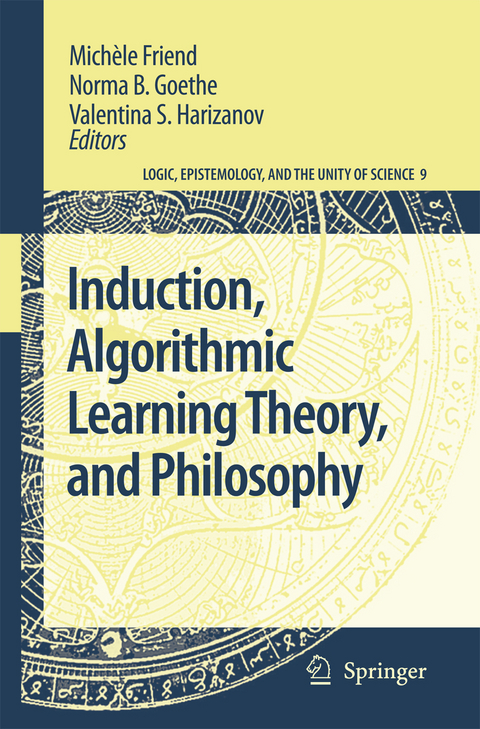
Induction, Algorithmic Learning Theory, and Philosophy
Seiten
2007
Springer-Verlag New York Inc.
978-1-4020-6126-4 (ISBN)
Springer-Verlag New York Inc.
978-1-4020-6126-4 (ISBN)
The idea of the present volume emerged in 2002 from a series of talks by Frank Stephan in 2002, and John Case in 2003, on developments of algorithmic learning theory. Following the talks, ValentinaHarizanovandMichèleFriendraised thepossibility ofanexchange of ideas concerning algorithmic learning theory.
The idea of the present volume emerged in 2002 from a series of talks by Frank Stephan in 2002, and John Case in 2003, on developments of algorithmic learning theory. These talks took place in the Mathematics Department at the George Washington University. Following the talks, ValentinaHarizanovandMichèleFriendraised thepossibility ofanexchange of ideas concerning algorithmic learning theory. In particular, this was to be a mutually bene?cial exchange between philosophers, mathematicians and computer scientists. Harizanov and Friend sent out invitations for contributions and invited Norma Goethe to join the editing team. The Dilthey Fellowship of the George Washington University provided resources over the summer of 2003 to enable the editors and some of the contributors to meet in Oviedo (Spain) at the 12th International Congress of Logic, Methodology and Philosophy of Science. The editing work proceeded from there. The idea behind the volume is to rekindle interdisciplinary discussion. Algorithmic learning theory has been around for nearly half a century. The immediate beginnings can be traced back to E.M. Gold’s papers: “Limiting recursion” (1965) and “Language identi?cation in the limit” (1967). However, from a logical point of view, the deeper roots of the learni- theoretic analysis go back to Carnap’s work on inductive logic (1950, 1952).
The idea of the present volume emerged in 2002 from a series of talks by Frank Stephan in 2002, and John Case in 2003, on developments of algorithmic learning theory. These talks took place in the Mathematics Department at the George Washington University. Following the talks, ValentinaHarizanovandMichèleFriendraised thepossibility ofanexchange of ideas concerning algorithmic learning theory. In particular, this was to be a mutually bene?cial exchange between philosophers, mathematicians and computer scientists. Harizanov and Friend sent out invitations for contributions and invited Norma Goethe to join the editing team. The Dilthey Fellowship of the George Washington University provided resources over the summer of 2003 to enable the editors and some of the contributors to meet in Oviedo (Spain) at the 12th International Congress of Logic, Methodology and Philosophy of Science. The editing work proceeded from there. The idea behind the volume is to rekindle interdisciplinary discussion. Algorithmic learning theory has been around for nearly half a century. The immediate beginnings can be traced back to E.M. Gold’s papers: “Limiting recursion” (1965) and “Language identi?cation in the limit” (1967). However, from a logical point of view, the deeper roots of the learni- theoretic analysis go back to Carnap’s work on inductive logic (1950, 1952).
to the Philosophy and Mathematics of Algorithmic Learning Theory.- to the Philosophy and Mathematics of Algorithmic Learning Theory.- Technical Papers.- Inductive Inference Systems for Learning Classes of Algorithmically Generated Sets and Structures.- Deduction, Induction, and beyond in Parametric Logic.- How Simplicity Helps You Find the Truth without Pointing at it.- Induction over the Continuum.- Philosophy Papers.- Logically Reliable Inductive Inference.- Some Philosophical Concerns about the Confidence in ‘Confident Learning’.- How to Do Things with an Infinite Regress.- Trade-Offs.- Two Ways of Thinking about Induction.- Between History and Logic.
| Reihe/Serie | Logic, Epistemology, and the Unity of Science ; 9 |
|---|---|
| Zusatzinfo | XIV, 290 p. |
| Verlagsort | New York, NY |
| Sprache | englisch |
| Maße | 155 x 235 mm |
| Themenwelt | Geisteswissenschaften ► Philosophie ► Allgemeines / Lexika |
| Geisteswissenschaften ► Philosophie ► Erkenntnistheorie / Wissenschaftstheorie | |
| Mathematik / Informatik ► Mathematik ► Logik / Mengenlehre | |
| ISBN-10 | 1-4020-6126-9 / 1402061269 |
| ISBN-13 | 978-1-4020-6126-4 / 9781402061264 |
| Zustand | Neuware |
| Haben Sie eine Frage zum Produkt? |
Mehr entdecken
aus dem Bereich
aus dem Bereich
die letzten Jahre der Philosophie und der Beginn einer neuen …
Buch | Hardcover (2024)
Klett-Cotta (Verlag)
CHF 39,20
Gesundheitsschutz, Selbstbestimmungsrechte, Rechtspolitik
Buch | Softcover (2024)
Kohlhammer (Verlag)
CHF 54,60
Jenseits von Identität | Ausgezeichnet mit dem Leipziger Buchpreis …
Buch | Softcover (2023)
Ullstein Taschenbuch Verlag
CHF 19,55


